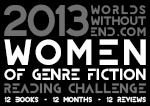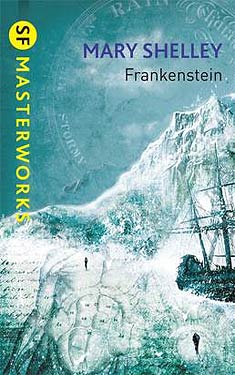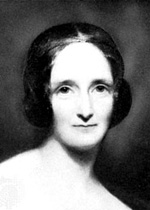WoGF Review: Frankenstein by Mary Shelley
 Neringa Terleckaite’s (Zoori): My passion for reading comes from my parents. The very first SF book I read was the Desert by Colin Wilson of Spider-world series. Since then I am convinced that spiders are mind-readers, however, all means of communication have failed so far. SF is a way of escapism for me, as well as a celebration of human imagination combined with its universal themes. WoGF is a great encouragement to discover new worlds, and tell others about them.
Neringa Terleckaite’s (Zoori): My passion for reading comes from my parents. The very first SF book I read was the Desert by Colin Wilson of Spider-world series. Since then I am convinced that spiders are mind-readers, however, all means of communication have failed so far. SF is a way of escapism for me, as well as a celebration of human imagination combined with its universal themes. WoGF is a great encouragement to discover new worlds, and tell others about them.
 Frankenstein; or, The Modern Prometheus is a novel written by Mary Shelley.
Frankenstein; or, The Modern Prometheus is a novel written by Mary Shelley.
I believe that starting my WoGF readings with Frankenstein by Mary Shelley has been a logical choice in terms of chronology of the genre: this book is considered one of the first modern science fiction novels. It has also been practical, since that was the only unread SF/F woman writer in my personal collection (until I learnt of WoGF). Starting my WoGF reviews with a world’s classic horror story is challenging. Who has not heard of Frankenstein or seen one of its many adaptations in popular culture? The name has become part of the English dictionary meaning “a person who creates something that brings about his ruin” contrary to the common confusion of the name with the actual monster. However, how many actually know it was written by a woman author? Or that it was first published anonymously in 1818?
It is a story of Victor Frankenstein, a young, bright and ambitious scientist, who creates a living being in his laboratory. Only after witnessing the awakening of the monster does he realize the madness and horror behind this act, and escapes his creation only to become haunted by it. Gradually not only his sanity but also his personal life gets ripped to pieces by the consequences of such action, in the end turning into a deadly chase. The question is: who is the actual monster?
The main theme and the center of the book is the relationship of the creator and his creation and the creator’s responsibility for his creature’s actions, their dependency on each other. The creator (Victor) escapes from his monster and expects it to perish, refusing to take consequences for his own actions. However, the monster lives and learns to survive on his own. First of all, he learns to sustain his physical needs. Soon afterwards he learns of his alien nature: because of his deformity, society rejects and despises him due to prejudice without giving him a chance to prove them wrong. The creature understands he is the only one of his kind, “a fallen angel” who was abandoned by his creator, and that leads to his anger towards all the human race and a will to revenge himself against such ignorance. This rejection and his loneliness is the cause of the character’s ruin.
Frankenstein has various literal references to Paradise Lost and the creation of the first man, the parallel to Prometheus who stole the light of knowledge from the Gods, which helps us understand the story.
 When I first started reading the book, I had to get used to its epistolary form which is not too common to a modern reader like myself, however, eventually the reading becomes very rewarding because of its personal and close account of events. What I particularly enjoyed about the story is that it is made of several layers: it is a story of a story within a story. It starts with a narration of Robert Walton who goes on an expedition of discovery to the North and meets Victor Frankenstein. Victor tells his own experience including the narration of his creature from the first person’s point of view. This way in the absence of a single omniscient narrator, the story is displayed from three different perspectives. On the other hand, this reduces the actual credibility due to the subjective point of view of all of its narrators.
When I first started reading the book, I had to get used to its epistolary form which is not too common to a modern reader like myself, however, eventually the reading becomes very rewarding because of its personal and close account of events. What I particularly enjoyed about the story is that it is made of several layers: it is a story of a story within a story. It starts with a narration of Robert Walton who goes on an expedition of discovery to the North and meets Victor Frankenstein. Victor tells his own experience including the narration of his creature from the first person’s point of view. This way in the absence of a single omniscient narrator, the story is displayed from three different perspectives. On the other hand, this reduces the actual credibility due to the subjective point of view of all of its narrators.
It has been a wonder to read such a story when I thought I knew all about it, and how it was going to end. I have discovered that Frankenstein is not only a story about the creation of a monster, it is a tale of a development of self-consciousness, integration to society and its influence on an individual, a search for origins and meaning of existence.



















 Full Details
Full Details


2 Comments
A fine review; thank you for sharing it with us. I would like to add some context to the story’s setting. The arctic voyage, was all the rage during this era as Great Britain attempted to find the Northwest Passage (across the top of the Canadian Archipelago, down the Bering Straight and right to China’s riches). At the time northern Canada was not mapped but glance at a map now and you’ll know how the search ended. Despite many failed efforts the leaders of the Royal Navy sent ship after ship for decades trying to find a way through.
One of the chief champions of the Northwest Passage – First Secretary of the Admiralty John Wilson Croker – actually reviewed Shelly’s book and, “conceded that the writing had vigor but called it in other respects ‘a tissue of horrible and disgusting absurdity.'” Oh the irony. “Shelly had grown up in a household surrounded by books, she had read deep into books of voyages and travel, and she had taken from them quite a different lesson from the lessons [Croker] took. Men start out, blithely and idealistically, without thinking of the consequences, on enterprises fraught with danger and rich with the potential to go horribly wrong. Dr. Victor Frankenstein’s all-too-successful attempt to reanimate dead flesh was one such enterprise. Expeditions to the Arctic were another.”
The story of the Northwest Passage is detailed in the book, “The Man Who Ate His Boots”. Its conclusion is apropos both Frankenstein and the Northwest Passage. “We can admire courage, even the persistence of the quest. But if we respect history at all we must temper whatever admiration we may feel with the image of pieces of human arms and legs cooking in a kettle while starving men stare with deadened eyes at the ultimate consequences of this spectacular piece of folly.”
Thank your for reading and posting your comment. I did not know of the importance of the historic voyages to the North, and “The Man Who Ate His Boots” really seems to be worth checking out.
I agree with you that the context is indeed important to the story, as it reflects the scientific, philosophical and political ideas of its time. One of the most important aspects of science for Mary Shelley centre upon the essential ‘masculinity’ of scientific thought (Dr Siv Jansson).
Sorry, the comment form is closed at this time.